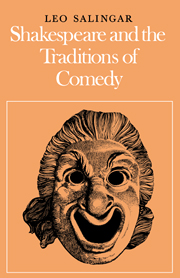6 - An Elizabethan playwright
Published online by Cambridge University Press: 04 December 2009
Summary
I must have wanton Poets, pleasant wits,
Musicians, that with touching of a string
May draw the pliant king which way I please:
Music and poetry is his delight,
Therefore I'll have Italian masks by night,
Sweet speeches, comedies, and pleasing shows.
Marlowe (c. 1592)The best actors in the world, either for tragedy, comedy, history, pastoral, pastoral-comical, historical-pastoral, tragical-historical, tragical-comicalhistorical-pastoral, scene individable, or poem unlimited. Seneca cannot be too heavy, nor Plautus too light.
Hamlet (c. 1601)Player is like a garment which the tailor maketh at the direction of the owner; so they frame their action at the disposing of the poet: so that in truth they are reciprocal helps to one another; for the one writes for money, and the other plays for money, and the spectator pays his money.
‘T.G.’(1616)The young lovers in Shakespeare's three earliest comedies – Antipholus of Syracuse, Lucentio, and Valentine and Proteus – all have this in common, that they are swept off their feet shortly after arriving at a strange city. They are all ‘transformed’ by love in unfamiliar surroundings. It does not seem far-fetched to read into these plays, with the intimately known bourgeois settings in the first two and the vaguely descried court in the third, something of the author's inner struggle for adjustment, as a young provincial trying his fortunes in London. And possibly there are projections from a more intimate part of Shakespeare's experience in Antipholus's encounter at Ephesus with the neglected but possessive wife of his other self.
- Type
- Chapter
- Information
- Shakespeare and the Traditions of Comedy , pp. 243 - 326Publisher: Cambridge University PressPrint publication year: 1974



